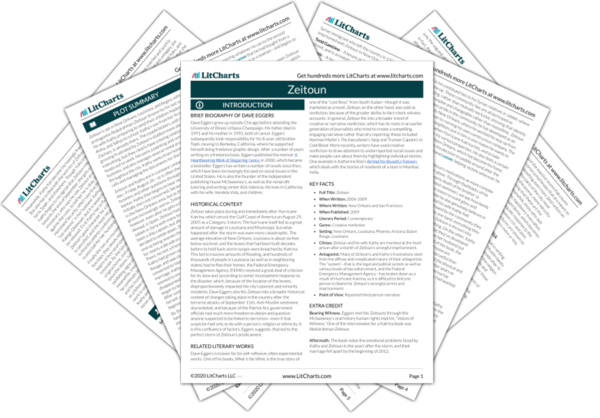Summary
Analysis
In the morning Zeitoun realizes that the little food left in the freezer will be rotten by the next day. Apart from some meat that he’ll feed to the dogs, he decides to cook the rest, and to have a barbecue with Todd and Nasser that night.
Without electricity in the sweltering Louisiana late summer, Zeitoun has few options for eating apart from the MREs being dropped all over the city by helicopters and rescue units.
Themes
Ahmaad, Kathy, and the kids arrive in Arizona midday on Saturday, where the kids immediately start playing with Yuko and Ahmaad’s five children. Kathy tries to distract herself and not think of where her husband might be.
Kathy’s arrival in Arizona allows her to relax somewhat regarding the needs of her children (and tensions with her family), though it doesn’t remove her concerns about Zeitoun.
Themes
Zeitoun and Nasser decide to check Uptown to see if anyone needs help. The canoe goes faster with two men paddling, and they whiz by the submerged houses. Nasser spots a helicopter low over one roof. They paddle closer to see what’s happening, and catch sight of a body face down in the water. A man in the helicopter is pointing a camera at the body. Then the helicopter rises and zips off.
The reporter Zeitoun and Nasser see taking a picture of a dead body seems like an especially symbolic act—another example of the media dehumanizing and sensationalizing the victims of the storm, rather than trying to help them.
Themes
Zeitoun is distraught as they paddle silently to Claiborne. He wonders if the man could have been helped in time. When he reaches Claiborne, the phone is ringing: it’s Zeitoun’s brother Ahmad, who says he wishes Zeitoun would leave the city. The kids are worried about him, Ahmad says, with the pictures of devastation on CNN every day. Zeitoun tries to reassure him, grateful for his constant concern. Ahmad had once called Zeitoun to arrange for the family to meet at the corner of Bourbon Street and St. Peter, where there happened to be a webcam that could stream video of the family to Ahmad via a website. They did so, standing awkwardly for awhile since they couldn’t find the webcam, but Ahmad called back later, thrilled that he had been able to see them.
In addition to assuming responsibility for his own neighbors—including the pets—Zeitoun has grown to feel responsible for anyone in the vicinity whom he feels could have been helped. As we have just seen in Zeitoun’s recollections about his years at sea with Ahmad, it seems that the older of the brothers continues to feel protective. Ahmad’s frequent calls—and even the ability to see the family in the webcam—help make Ahmad feel that he isn’t as far away from Zeitoun and the rest of the family, and can maintain a close connection with them.
Themes
Get the entire Zeitoun LitChart as a printable PDF.

That night Zeitoun, Todd, and Nasser barbecue the meat that’s left: their first social event since the storm. They talk about FEMA and the Superdome—there are reports that it’s an absolute mess there. They wonder what the city will look like with the water gone, like a dredged lake. Then Zeitoun sees an orange light less than a mile away. He realizes that the fire is close to his office, where there are hundreds of gallons of flammable paint. The men pile into the motorboat and speed towards the fire, which has engulfed an entire block. Zeitoun’s office is only twenty feet away, and the fire station several blocks away is empty and flooded. They can only watch.
It’s a motley group and a somewhat somber social event, what with the flooded venue and the somber topics of conversation, but for the first time Zeitoun isn’t spending the night alone but rather with other members of his small community. Although he has maintained some kind of control over his days by paddling around in his canoe, the fire (as well as the dead body) are reminders that Zeitoun cannot be in control of or responsible for much else.
Themes
The wind picks up and blows away from Zeitoun’s office. He thanks God, as he watches somberly. There are no sirens or signs of authority, just a block of homes sinking into the water. Zeitoun recalls passages in the Qur’an about the flood and God’s wrath, but he feels a kind of order in the night too.
Again, Zeitoun is reminded of the Biblical story of Noah’s Ark and the flood: a story that is part of Islamic tradition as well as that of Christianity and Judaism—a complex story in which wrath, destruction, and renewal coexist.
Themes
Zeitoun recalls being on a tanker 20 years earlier in the Philippines, speaking about the existence of God with the Greek captain, an atheist. Zeitoun had watched the captain pilot the ship through the treacherous sandbars, high shelves, and around the island of the high seas. He told the captain that without a captain like him, a ship couldn’t navigate, and he argued that any vessel needed a captain. The Greek captain appreciated the beauty of this metaphor, but he hadn’t answered.
Although Zeitoun has suffered in a number of ways throughout his life, what never changes is his unshakable belief in God and his commitment to his Muslim faith. This anecdote shows both Zeitoun’s cleverness and his sense of awe and beauty at the natural world, one that for him only makes sense with God as its creator.
Themes












